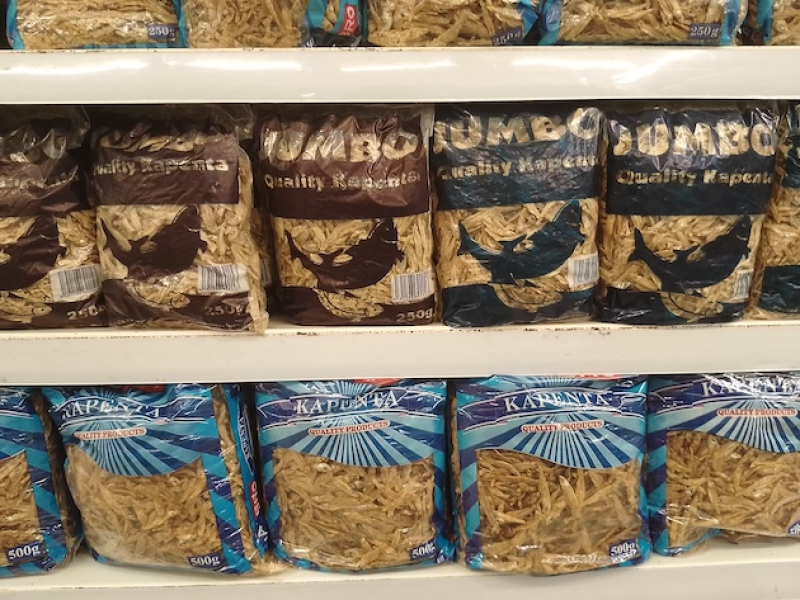- 94 Palestinians killed in Gaza, 45 people at aid sites |
- Opening of UN rights office at talk stage: Foreign Adviser |
- AC Tabassum Urmi sacked over anti- govt Facebook posts |
- Bangladeshi killed in BSF firing at Chuadanga border |
- Rains Fuel Disasters in 83pc of Brazilian Cities: Report |
African Fishers Left Out of Global Trade Negotiations

Fish products on sale in a supermarket in Zimbabwe.
A new report has raised concerns about the exclusion of African fish workers from trade protocols between their governments and developed countries, leaving impoverished communities reliant on fishing.
This comes as the impact of Africa’s trade protocols with blocs such as the European Union and the United States is being examined, especially regarding how they affect local small-scale fisheries.
Millions of people rely on fisheries in Africa, where the sector provides jobs and nutrition, but there are increasing complaints among fishermen—who lack organized representation—and researchers who say fishers have been pushed out of business by wealthy foreign companies.
In a recent update titled From Promises to Perils: Small-Scale Fisheries Overlooked in the EU-Gabon, the Coalition for Fair Fisheries Arrangements uses the small African nation as an example of how the continent’s fishers are getting the short end of the stick despite being at the front line of the lucrative sector.
The coalition examines how Sustainable Fisheries Partnership Agreements (SFPAs) have failed small-scale fishing communities, as they “have almost not been involved in these decision-making processes.”
“As Gabon and the European Union (EU) now consider renewing the tuna SFPA, local fisheries remain largely excluded from negotiations and see few benefits from the agreement,” said Beatrice Gorez, coordinator for the Coalition for Fair Fisheries Arrangements.
According to the coalition, Gabon entered into a trade agreement with the EU in 2021, granting European fishing boats the right to harvest tuna within Gabonese waters.
More than 32,000 tons of tuna are hauled from Gabonese waters annually, making the African country the EU’s second-largest tuna fishing partner.
However, despite these large numbers, the coalition says that with the trade protocol set to be reviewed next year, little protection has been put in place for local fishers.
“The EU reiterated the crucial role of small-scale fisheries for Gabon’s economy and food security. Yet, with the current protocol set to expire in 2026, the visits appeared more focused on identifying future actions to maximize the impact of the protocol,” Gorez said.
The EU sets aside €2.6 million annually in exchange for access to Gabon’s fisheries, and the funds go toward management, combating illegal fishing, and protecting fragile ecosystems contributing to the health of stocks and marine protected areas.
Local fishers say that despite these assurances, communities have been excluded from negotiations.
This is confirmed by the Gabonese Federation of Small-Scale Fisheries Actors (FEGAPA), founded in 2023 and now comprising around 20 cooperatives of fishers, fishmongers, and processors. “The fishers were never consulted about the fishing agreement,” said Jean de Dieu Mapaga, president of FEGAPA.
“It is true that we hear talk of government projects to develop certain fishing centres, but no one has ever explained that these investments are linked to sectoral support funding for small-scale fisheries under the EU-Gabon SFPA,” Mapaga said in the report.
Gabon is not the only African country facing such challenges, where international fishing companies have a huge presence and small fishing communities have to compete for catches.
“This pattern is not unique to Gabon. In countries like Liberia, so-called ‘experimental’ fishing has similarly served as a backdoor for accessing high-value resources for which a surplus had not yet been established,” Gorez noted.
“Sectoral support from the Sustainable Fisheries Partnership Agreements must not remain theoretical; it must contribute concretely and transparently to these national efforts—something that, to date, has not been the case,” said Gorez.
The United Nations Economic Commission for Africa (UNECA) says African countries face pressing challenges in the blue economy, including declining fish catches and falling incomes for local fishers due to overfishing.
“Africa’s blue economy holds untapped economic potential,” Claver Gatete, UNECA executive secretary, told the Africa Regional Forum on Sustainable Development held in Uganda in April this year.
“However, marine degradation, weak governance, and underinvestment threaten its sustainability,” Gatete added.
These sentiments highlight concerns raised by small fishing communities, who are demanding a place at the negotiating table between their governments and blocs such as the EU and the US.
“The Central African region has a historically uncompetitive marine and river transport system, with inadequate infrastructure and sectoral strategies,” UNECA said in a March update that seeks to unlock “the vast potential of blue resources.”
The Food and Agriculture Organization says that while global fisheries have surged, Africa’s potential remains untapped.
“Targeted policies, technology transfer, capacity building, and responsible investment are crucial to boost sustainable aquaculture where it is most needed, especially in Africa,” FAO noted in a 2024 report on the state of global fisheries.
The World Bank estimates that the fisheries and aquaculture sectors contribute USD 24 billion to the African economy while providing employment to over 12 million people.
The Coalition for Fair Fisheries Arrangements says for communities to benefit from the sector, consultations must be inclusive—something that would also go a long way toward addressing illegal fishing.
“Exclusion from decision-making has led to a lack of understanding of local realities,” said Gorez.

